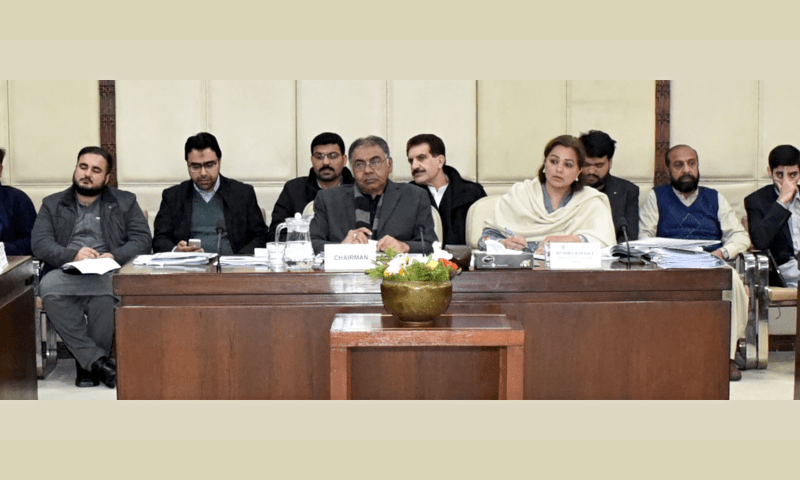Introduction: Government’s Vision for Tax Reform
The Pakistani government is targeting a significant increase in its tax-to-GDP ratio, with an ambitious goal of raising it from the current 10% to 13.5% over the next three years. This initiative is part of a broader effort to improve tax collection, enforce compliance, and reduce the reliance on external loans. Finance Minister Muhammad Aurangzeb highlighted the importance of these reforms during a meeting of the Senate Standing Committee on Finance and Revenue. The committee convened to discuss the Tax Laws (Amendment) Bill 2024 but was postponed due to a lack of quorum. Nonetheless, the proposed amendments reflect the government’s commitment to tax modernization and increasing tax revenue through a combination of digital tools, better enforcement, and fairness in the tax system.
The Need for Tax Reform in Pakistan
Pakistan’s tax system has long been plagued by low compliance, inefficiency, and a small tax base. With only 10% of GDP collected as tax, the country lags behind other nations in terms of tax collection. In a country with significant income disparity and an expanding informal sector, it has become essential to restructure the tax system to ensure fairness and effectiveness.
The government aims to increase the tax-to-GDP ratio to 13.5% by focusing on a few core areas: tightening tax compliance, expanding the tax base, and leveraging technology. The Finance Minister emphasized that the amendments proposed in the Tax Laws (Amendment) Bill 2024 would be crucial for improving these aspects.
Key Elements of the Tax Reforms
The Finance Minister’s announcement underscored the critical role of digitalization, enforcement, and fair taxation in the upcoming reforms. Below are the central pillars of the tax overhaul:
1. Digitalization of Tax Collection
A key component of the tax reform strategy is the digitalization of the Federal Board of Revenue (FBR). By moving toward a fully digital tax system, the government aims to reduce human intervention, streamline processes, and make tax collection more efficient. This will include automating tax return submissions, enhancing data collection, and reducing opportunities for corruption and errors. The digital shift is expected to improve the overall performance of the tax authority and increase the number of registered taxpayers.
2. Strict Enforcement of Tax Laws
Finance Minister Aurangzeb pointed out that one of the main challenges facing the tax system in Pakistan is the low registration of taxpayers. Despite the willingness of many citizens to pay taxes, they are often reluctant to formally register themselves within the system. The government plans to bring unregistered individuals into the tax net through more aggressive enforcement. This includes measures such as imposing penalties on non-filers and using technological tools to track high-income earners who evade taxes.
The government also intends to crack down on sales tax evasion, which continues to be a major issue. FBR Chairman Rashid Langrial emphasized that sales tax evasion is more unethical than income tax evasion, as it disproportionately affects the economy and public services.
3. Separation of Tax Policy and FBR Operations
To ensure a more transparent and efficient system, the government is moving ahead with plans to separate the Tax Policy Unit from the FBR. This will allow for a clearer distinction between policy-making and administrative functions, reducing potential conflicts of interest and improving accountability in the tax system. This separation is expected to play a significant role in the transformation of Pakistan’s tax landscape, ensuring better planning and implementation of tax policies.
4. Improving Public Trust in Tax Authorities
Rebuilding trust between the government and taxpayers is a major goal of the new reforms. Senator Shibli Faraz, Leader of the Opposition, raised concerns over the lack of public confidence in the tax system. He stressed that without trust, no significant progress could be made. In response, the Finance Minister outlined the “People Process Technology” initiative, which aims to modernize tax systems and improve transparency in the collection process. This initiative is designed to restore faith in tax authorities and ensure that the system works for all citizens.
FBR’s Role and Challenges
The Federal Board of Revenue (FBR) has faced numerous challenges in achieving its tax collection targets. Despite having 62,000 registered entities, only 42,000 are actively paying sales tax. This highlights the need for greater tax compliance and stronger enforcement of tax laws. Chairman Langrial also pointed out that the current disparity between reported incomes and actual spending remains a significant challenge for tax authorities.
The proposed amendments in the Tax Laws (Amendment) Bill 2024 aim to address these issues by increasing penalties for non-filers and under-reporters. FBR intends to confiscate goods and assets of companies that consistently fail to meet their tax obligations, ensuring that tax evasion is not financially viable.
Broadening the Tax Base
The government’s proposed reforms are also geared toward broadening the tax base. Chairman Langrial has suggested that the tax-to-GDP ratio could reach around 13% within the next four to five years through a combination of measures, including better sales tax collection, increased income tax compliance, and higher customs duties. These efforts are expected to bring more taxpayers into the system, which will ultimately lead to a more sustainable tax base.
The Role of Provinces in Tax Collection
One of the challenges mentioned during the meeting was the relatively low contribution of provinces to tax collection. According to the Finance Minister, provinces currently collect only 0.8% to 0.9% of taxes, while the FBR is responsible for collecting 1% through the petroleum development levy. To address this imbalance, the government plans to work closely with provincial tax authorities to increase their contribution to the national tax base.
Classification of the Bill: Money Bill or Ordinary Bill?
An important debate that arose during the Senate Standing Committee meeting was whether the Tax Laws (Amendment) Bill 2024 should be classified as a money bill or an ordinary bill. Senator Shibli Faraz questioned the nature of the bill, given its impact on revenue and taxation. Secretary for Law and Justice, Raja Naeem Akbar, clarified that under Articles 73(2) and 75 of the Constitution, the bill falls under the category of a money bill.
This classification has important implications, as money bills can only be introduced in the National Assembly and must be passed within a set timeframe. This designation will help expedite the legislative process for the proposed tax amendments, ensuring that they are implemented as soon as possible.
Government’s Empathy for the Salaried Class
The government has expressed its empathy for the salaried class and is committed to ensuring that the new tax reforms do not disproportionately burden low- and middle-income earners. The Finance Minister assured the committee that 95% of citizens would not be negatively impacted by the proposed changes. Efforts are underway to create a fair balance between the different socioeconomic classes in Pakistan, ensuring that the tax system is equitable and does not place undue stress on any particular group.
FAQs on the Proposed Tax Reforms
Q1: What is the government’s target for the tax-to-GDP ratio?
The government aims to increase the tax-to-GDP ratio from 10% to 13.5% within the next three years.
Q2: How will the tax system be digitalized?
The government plans to fully digitalize the Federal Board of Revenue (FBR) to reduce human intervention, improve efficiency, and enhance data collection.
Q3: Will the new tax amendments introduce new taxes?
No, the amendments will not introduce new taxes. They are focused on improving compliance and addressing issues like non-filing and under-filing.
Q4: How does the government plan to increase public trust in the tax system?
The government’s “People Process Technology” initiative aims to modernize tax systems and improve transparency, thereby restoring public trust.
Q5: What is the significance of separating the Tax Policy Unit from the FBR?
This separation is intended to improve transparency and accountability in Pakistan’s tax system by creating a clear distinction between policy-making and administrative functions.
Conclusion
The government’s proposed tax reforms represent a bold and necessary step towards improving Pakistan’s tax system. With a focus on digitalization, better enforcement, and broader compliance, these reforms aim to increase the tax-to-GDP ratio and strengthen the nation’s fiscal position. By addressing existing issues and building trust, the government hopes to create a fairer, more efficient tax system that benefits all citizens.
SEE ALSO


